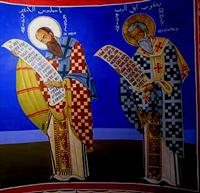 In the beginning, God created human beings in His own image and likeness. The Greek word in the Holy Scripture that means "human being," anthropos, is in the masculine form. Since it is a masculine term, does it only refer to men? Were only men created in the image and likeness of God? Are women less than human?
In the beginning, God created human beings in His own image and likeness. The Greek word in the Holy Scripture that means "human being," anthropos, is in the masculine form. Since it is a masculine term, does it only refer to men? Were only men created in the image and likeness of God? Are women less than human?St. Basil the Great answered these questions in the 4th century:
But that nobody may ignorantly ascribe the name of human only to the man, it [the Holy Scripture] adds, "Male and female he created them" [Gen 1.27]. The woman also possesses the creation according to the image of God, as indeed does the man. The natures are alike of equal honor, the virtues are equal, the struggles equal, the judgments alike. Let her not say, "I am weak." Weakness is in the flesh, in the soul is power. Since indeed that which is according to God's image is of equal honor, let the virtue be of equal honor, the showing forth of good works. There is no excuse for one who wishes to allege that the body is weak. And why is it simply delicate? But through compassion it is vigorous in patient endurance and earnest in vigils. When has the nature of man been able to match the nature of woman in patiently passing through her own life? When has man been able to imitate the vigor of women in fastings, the love of toil in prayers, the abundance in tears, the readiness for good works?
The above quote is from "On the Origin of Humanity: Discourse 1" from On the Human Condition by St. Basil the Great, Translated by Nonna Verna Harrison, (Crestwood, NY: Saint Vladimir's Seminary Press, 2005. This is part of the SVS Press Popular Patristics Series. In the text presented in the book, St. Basil expresses the theology of the Church in the Greek rhetorical style. I recommend reading the primary text by St. Basil first before reading the translator's introduction. The book is available from Saint Vladimir Seminary Press and Amazon.com.
The biography of St. Basil the Great can be found on the website of the Greek Orthodox Archdiocese of North America (goarch.org).
The image of the icon of St. Basil, who is standing on the left, is from St. Philip Orthodox Church in Ft. Lauderdale, FL. Used by permission.
